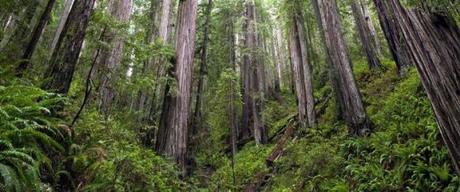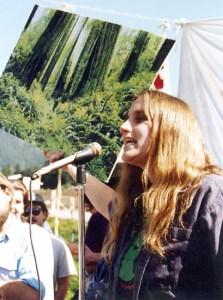GR: Judi Bari (1949-1997) wrote clearly and passionately about nature conservation. Her explanation of biocentrism is excellent.

Headwaters Forest Reserve
Biocentrism Definition of Nature Conservation

Judi Bari shows a photo blowup of Headwaters Forest as she speaks at a March 28, 1995 rally for Headwaters at Fisher Gate, near Carlotta CA. Photo (neg. A-22) by Nicholas Wilson, PO Box 943, Mendocino CA 95460.
“Deep ecology, or biocentrism, is the belief that nature does not exist to serve humans. Rather, humans are part of nature, one species among many. All species have a right to exist for their own sake, regardless of their usefulness to humans. And biodiversity is a value in itself, essential for the flourishing of both human and nonhuman life.
“These principles, I believe, are not just another political theory. Biocentrism is a law of nature, that exists independently of whether humans recognize it or not. It doesn’t matter whether we view the world in a human centered way. Nature still operates in a biocentric way. And the failure of modern society to acknowledge this – as we attempt to subordinate all of nature to human use – has led us to the brink of collapse of the earth’s life support systems.” –Judi Bari (Revolutionary Ecology)
Judi Bari read widely and used her knowledge to formulate a working definition of nature conservation. This is what she had to say about Marxist theory:
“According to Marxist theory, profit is stolen from the workers when the capitalists pay them less than the value of what they produce. The portion of the value of the product that the capitalist keeps, rather than pays to the workers, is called surplus value. The amount of surplus value that the capitalist can keep varies with the level of organization of the workers, and with their level of privilege within the world labor pool. But the working class can never be paid the full value of their labor under capitalism, because the capitalist class exists by extracting surplus value from the products of their labor.
“Although I basically agree with this analysis, I think there is one big thing missing. I believe that part of the value of a product comes not just from the labor put into it, but also from the natural resources used to make the product. And I believe that surplus value (i.e., profit) is not just stolen from the workers, but also from the earth itself. A clearcut is the perfect example of a part of the earth from which surplus value has been extracted. If human production and consumption is done within the natural limits of the earth’s fertility, then the supply is indeed endless. But this cannot happen under capitalism, because the capitalist class exists by extracting profit not only from the workers, but also from the earth.
“(Author’s note: At this point, Marxist scholars always object, citing Critique of the Gotha Program to say that Marx did recognize nature, as well as labor, as a source of value. But Marx makes the distinction between use value, which he says comes from nature and labor, and exchange value, which he says comes from labor alone. It is this point with which I am disagreeing. It seems obvious to me that use value, supplied by nature, helps determine exchange value. For example, redwood and fir trees grow side by side in the same forest, and at a similar rate. Yet the same amount of labor applied to cutting and mining a 600-year-old, 6-foot diameter redwood tree will produce more exchange value than if it were applied to cutting a 600-year-old, 6-foot diameter fir tree. The reason redwood is worth more is that it has certain qualities the fir lacks i.e., it is so rot resistant that it can be used for exposed siding or as foundation wood in direct contact with the soil, while the fir cannot. This quality of rot resistance does not come from anything added by human labor. It is a quality supplied by nature. So when I say that value comes from both labor and nature, I am referring to exchange value, not just use value.)” –Judi Bari, Revolutionary Ecology.

